Track & Trace


About
The term Track and Trace is so well-known in our industry that it might be thought that the concept is inseparable but, although they often make use of the same technology and the same standards, tracking and tracing are two distinct processes. The difference is in direction and point in time:
To track an object, you follow the path forwards from the starting point to wherever the object currently is, whereas, to trace an object, you follow the path backwards from its current point to where it began.
Both processes rely on a consistent system of identification which can guarantee the uniqueness of the identification of the object within the environment in which it circulates and in the automotive industry this usually means that the identifier of an object must be globally unique. The Odette Identification system is recognised by ISO as being able to provide globally unique identifiers for objects in the supply chain in processes such a Track and Trace (see ISO/IEC 15459).
Many objects can be tracked and traced but in the automotive supply chain, the processes are most commonly applied to the tracking of shipments of parts, the tracking and tracing of assets such as containers which circulate between customers, suppliers and other parties, the management of the distribution of finished vehicles and the control and tracing of individual parts both during and after assembly into the vehicle. This latter use is becoming increasingly important as the additional requirements for compliance in the areas of corporate social responsibility, customer protection and the environment become ever more stringent.
Several technologies can be employed to read or capture the unique identifier of an object and other associated information during different events in the automotive supply chain, including OCR, 1D and 2D Bar-codes, RFID, Bluetooth Low Energy etc.
Once captured, the information can be transmitted to IT systems using digital messages or REST-APIs.
Odette provides a standardised toolset for all partners involved in the automotive supply chain with our guideline for the use of the UN/EDIFACT IFTSTA message and our transport track and trace APIs.
News
-
news
Traceability of EV Batteries and Components
18 Nov 2024
For various reasons, including concerns about safety, quality and recyclability, Governmental Authorities, Vehicle Manufacturers and Battery Suppliers all want to be able to uniquely identify the individual components which make up a complete EV battery pack. To assist in the collection of data, Odette has published a standard digital message for Battery Data Exchange.
-

news
Transparency in Transport with API: Using mobile technology to bridge the visibility gap
12 Jun 2023
The transportation of production parts may be compromised for many reasons, especially in long distance supply chains. The customer needs to know as quickly as possible what impact a delay in the transport chain could have on the current production plan but often the link between the contents of a shipment and the means of transport carrying that shipment is missing, especially in a 4 corner model where actors are not in an established relationship or use web portals to carry out activities such as, ad-hoc ordering and confirmation of transport capacity.
-
news
Size matters for the Global Transport Label
02 Mar 2023
The automotive industry is increasingly moving to smaller pack quantities, for both deliveries and trackside storage, which has led to more and more tray and blister packaging being used. These very small packaging sizes pose particular challenges for labelling even with the small load container labels already specified by Odette. To meet these challenges, the Odette Technology Group has designed two even smaller labels which can carry the main data items of the Global Transport Label.
Resources
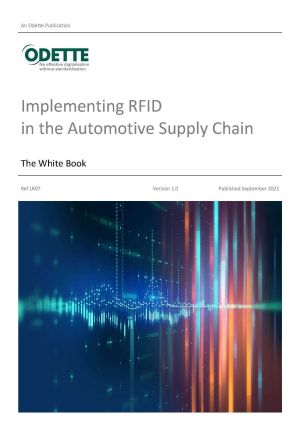
Implementing RFID in the Automotive Supply Chain
This recommendation aims to help the automotive industry, project leaders and users, and external technology integrators or vendors to implement RFID processes across different partners of the supply chain, in order to obtain good interoperability and avoid multiple solutions that could become a blocking point for industry suppliers.
The document covers different logistics and supply chain use cases, some of which are described in more detail in related annexes. It focuses on issues which contribute to defining common standards for a better interoperability between the partners involved.In terms of technology, many contactless radio frequency technologies are available and can justly be applied in specific use cases. In order to simplify the recommendations, this document focuses on Passive UHF (Ultra High Frequency) RFID technology.
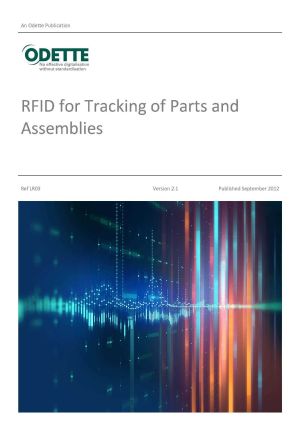
RFID for Tracking of Parts and Assemblies
This Odette recommendation describes the processes and methods of tracking and tracing of vehicle parts and enabling the authentication of original parts using RFID technology. It has been developed to move towards achieving widespread standardisation of RFID component usage, tag data storage and RFID technology implementation across supply chains.
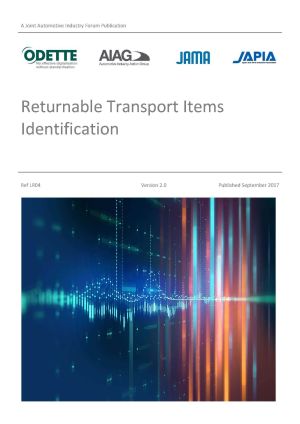
Returnable Transport Items Identification
Version 3 published March 2021. RFID technology has been widely adopted by the automotive industry in individual organisations due to the efficiency and security gains it delivers. However, widespread use between companies is currently much rarer due to compatibility issues. In response to this, Odette, AIAG, JAMA and JAPIA have jointly developed recommendations for RFID use in Returnable Transport Items Identification. The aim is to help moves toward the creation of general purpose global guidelines and accelerate further international adoption of RFID solutions.
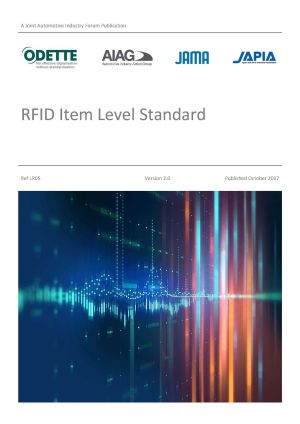
RFID Item Level Standard
Version 3 published March 2021. This Radio Frequency Identification (RFID) Item Level Standard describes best practices, processes, and methods for item identification, verification, traceability, product characteristics, and Vehicle Identification Number (VIN) throughout the global automotive supply chain. Extensive efforts have been made by the automotive industry to incorporate interchangeable data use between 2D optical symbols and electronic media such as RFID. This publication gives standards for the implementation and use of RFID in such applications and was jointly produced by Odette, AIAG, JAMA and JAPIA.
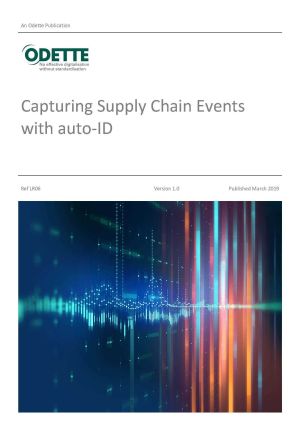
Capturing Supply Chain Events with auto-ID
To achieve process transparency, machine-readable objects and ways of tracking these objects along the process chain need to be defined and implemented. The Odette Recommendations LR01, LR02, LR03, LR04 and LR05 outlined the foundations and the next logical step is the implementation of standardised communication with all business partners across company boundaries, based on international standards he Odette Recommendation “Capturing Supply Chain Events with auto-ID” addresses this issue.
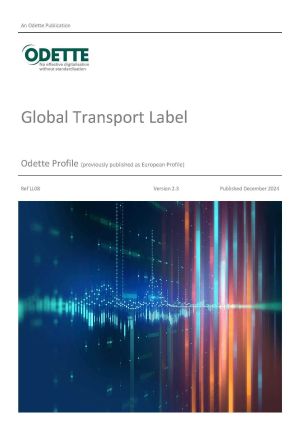
Global Transport Label - Odette Profile
(previously published as European Profile)
Members of the JAIF combined the best features from their own label standards – including ISO 15394, ANSI MH10.8.1, the Odette Transport Label and the AIAG B-10 to produce a standard Global Transport Label which includes features such as the ISO “Licence plate,” Linear Bar Code 128 and 2D Data Matrix, QR Code and PDF417. Based on this standard, an Odette profile has been further developed and maintained.
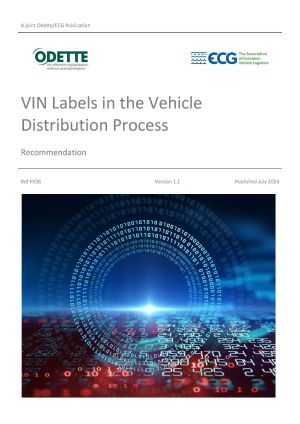
VIN Labels in the Vehicle Distribution Process
Developed by Odette and ECG, this recommendation has the following objectives:
- Define a standard location and fixing method for the vehicle identification label
- Recommend a size and layout for the vehicle identification label
- Define a minimum content for the vehicle identification label
- Recommend a bar-coding standard
- Provide recommendations for the quality of the vehicle identification label
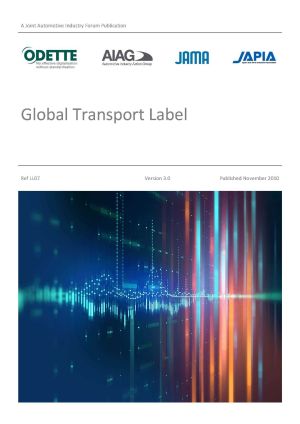
Global Transport Label
This document details common Global Transportation Label standards on container-labelling for use by suppliers and customers, and has been updated to include Data Matrix and QR code 2D symbologies. It was developed by collaboration between the members of Odette, AIAG and JAMA automotive associations representing more than 80% of worldwide production.
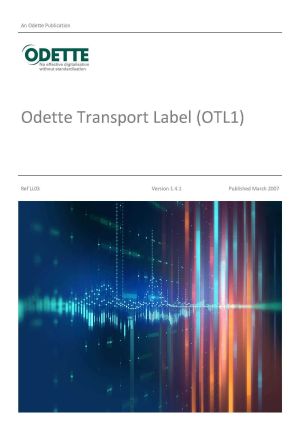
Odette Transport Label - Large (OTL1)
This is the original A5 Odette Transport Label (210mm x 102mm) which is designed to be used on product packaging units and transport packaging units sent between supplier and customer. First introduced in the 1980s, this label spec has been updated several times and is still in widespread use in the automotive industry today.
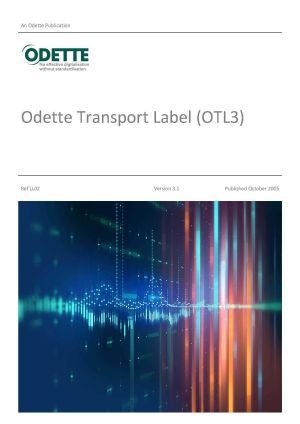
Odette Transport Label - Small (OTL3)
This Odette label (210mm x 74mm) was introduced to allow its use on smaller units where the original A5 label was too large. It also allows for the inclusion of additional logistics information to facilitate the automated movement of product packaging units from warehouse to trackside.
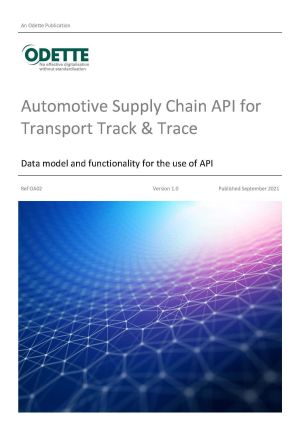
Automotive Supply Chain API for Transport Track & Trace
Describes how to define and implement standardised REST-API interfaces for the collection and provision of discrete pieces of information supporting logistics activities in the automotive supply chain.
It includes a data model and functionality for the use of REST-API in transport processes as an extension to established EDI data exchange processes.
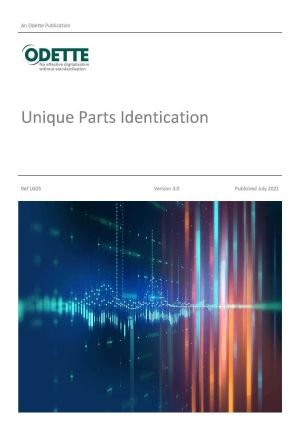
Unique Parts Identification
To accurately trace parts and components they should be clearly and easily identified using unique codes. This Odette recommendation provides details on how to implement and use Unique Part Identity (UPI) codes – one for each specific component – to achieve this. It explains how they can be used on safety components and enable access to the industrial history of a part or group of parts in component databases.
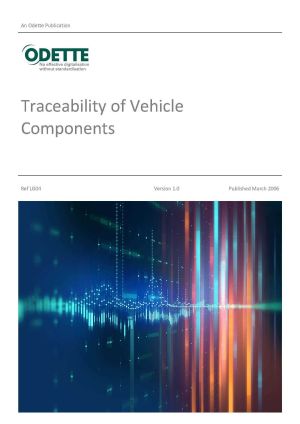
Traceability of Vehicle Components
The extended supply chains of automotive businesses require accurate and efficient traceability of parts and components across several layers. But to ensure that components can be traced properly throughout different organisations and systems, an element of standardisation of tracking processes is needed. This document includes a variety of standardised processes for implementing component traceability and identifying technical specifications.
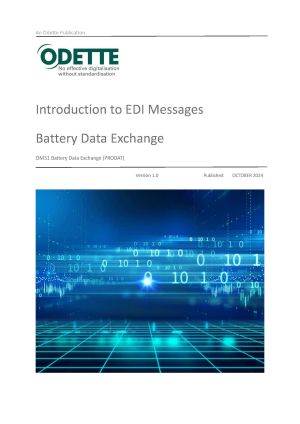
Odette Battery Data Exchange Message
EDI Implementation Guideline
PRODAT
Based on UN D.21A S4 - S3 Profile (Part 11)
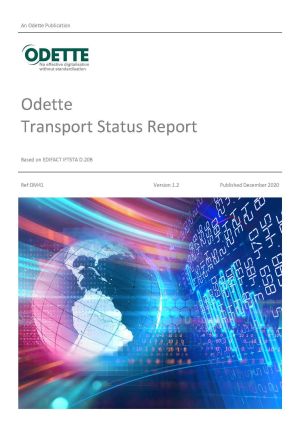
Odette Transport Status Report Message
EDI Implementation Guideline
IFTSTA
Based on EDIFACT IFTSTA D.20B
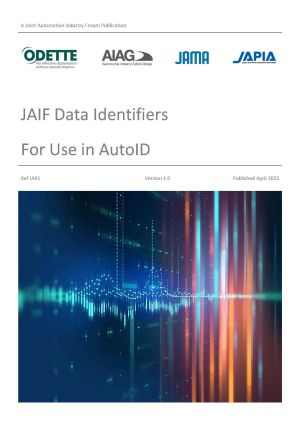
JAIF Data Identifiers for Use in AutoID
The JAIF* has created a separate table of the ANSI MH10.8.2 Data Identifiers that are actually in use in automotive AutoID applications or are referenced in the various AutoID Recommendations that have been published, either jointly or independently, by JAIF members.
The table of JAIF Data Identifiers is a subset of the full list of Data Identifiers specified in the Data Identifiers standard ANSI MH10.8.2 which is published and maintained by the MH10 Committee for Unit Loads and Transport Packages of MHI.
* Joint Automotive Industry Forum = AIAG, JAMA/JAPIA and Odette